Did you know over 60% of first-time applicants underestimate travel authorization expenses by 40%? Understanding application costs upfront prevents budget shocks when exploring northern destinations. Let’s break down what you need to prepare financially for your journey.
Single applicants pay CAD 100 in 2025 for standard processing. Groups of five or more benefit from family rates at CAD 500 – a 50% saving compared to individual payments. Biometric collection adds CAD 85 per person, with joint family submissions capped at CAD 170.
Payment remains final whether your request succeeds or not. Recent updates extended maximum validity periods, allowing repeat visits without reapplying for up to 10 years. This change particularly helps frequent travelers reduce long-term expenses.
Always use the government’s secure online portal for submissions and payments. Third-party sites might charge unnecessary service fees while offering identical processing. Direct applications ensure you pay exactly what’s required without hidden markups.
Key Takeaways
- Standard 2025 authorization charge: CAD 100 per individual applicant
- Family applications (5+ people) cost CAD 500 total
- Biometric collection adds CAD 85 per person or CAD 170 per family
- All payments are final, regardless of application outcome
- Official government portal is the safest payment channel
Understanding Canada Visa Fees for Tourist
Application charges aren’t just processing fees—they cover multiple security steps. Every payment supports thorough document reviews, background checks, and administrative work needed to assess requests. These mandatory costs apply whether your request gets approved or not.
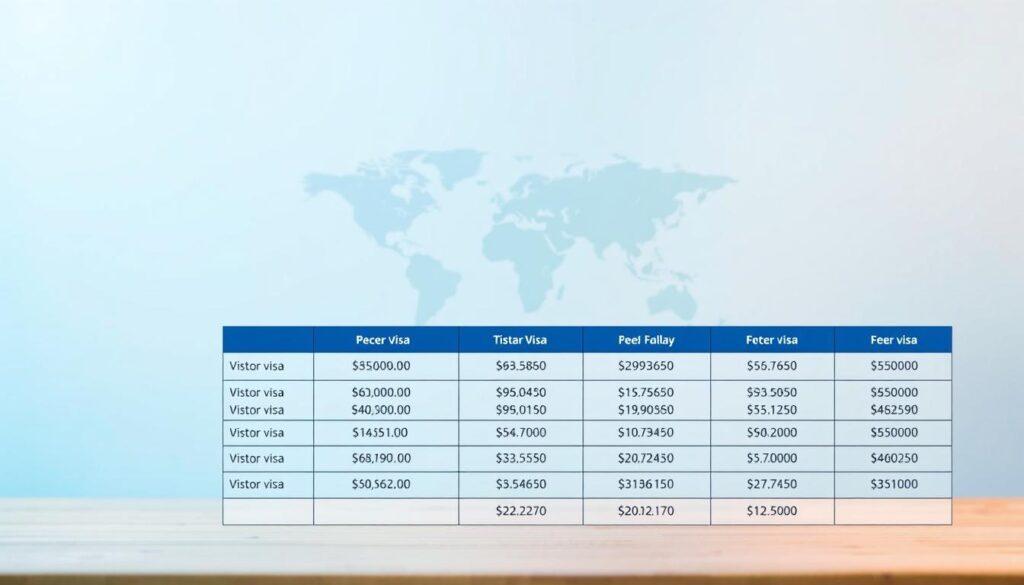
Core Service Inclusions
The standard per person charge includes verification of your financial documents, criminal record screening, and eligibility assessments. Temporary resident applicants pay the same base rate whether seeking single or multiple entries. Families benefit from bundled pricing when submitting together—five members pay less than half the individual rate.
Pricing Differences Explained
Work and study permits have separate cost structures reflecting their extended processing needs. While most applicants pay CAD 100 each, certain groups like diplomats or government officials qualify for exemptions. Always check the government portal for current rates before submitting—third-party sites often display outdated figures.
Remember—biometric collection and medical exams cost extra. These essential security measures get scheduled after initial payment through approved service centers. Budget accordingly to avoid last-minute surprises during your application journey.
Visa Application Process via the Official Canada Visa Portal
Streamlined digital systems now offer faster alternatives to traditional submission methods. Choosing between electronic and paper formats impacts processing speed, convenience, and tracking capabilities.
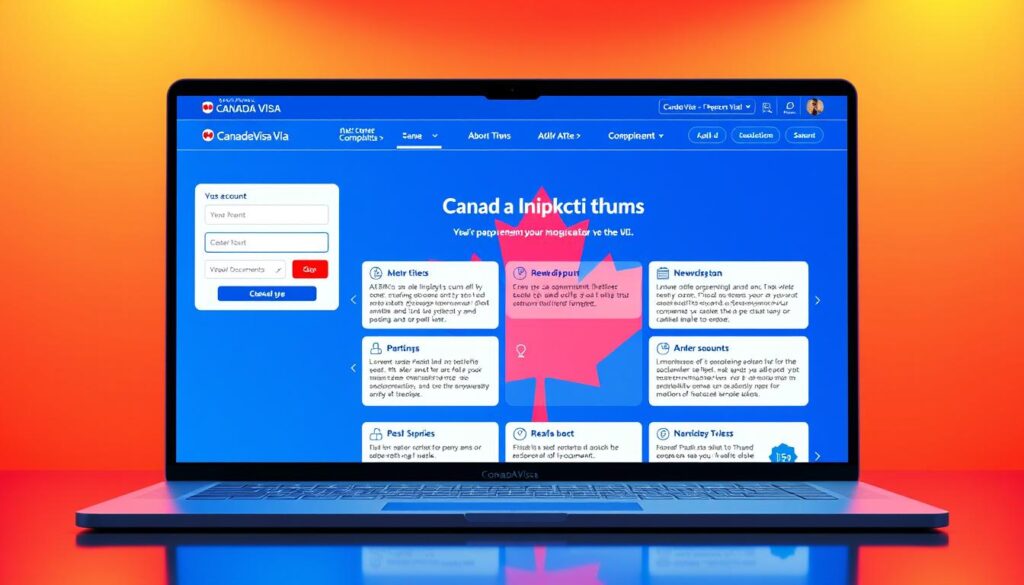
Online Application Steps
The government portal simplifies electronic submissions through guided forms. You’ll upload digital copies of required documents and receive instant confirmation upon completion. Secure payment gateways process fees directly, eliminating third-party delays.
Biometric instructions arrive via email within 30 days of payment. This automated system lets you book appointments at authorized centers without phone calls or wait times. Real-time updates through your account dashboard keep you informed at every stage.
Applying on Paper
Manual submissions require downloading specific forms from official websites. You must print documents using laser printers and sign them with black ink. Errors in handwritten applications often cause processing delays.
Physical submissions demand visits to designated centers during business hours. Staff verify original paperwork before accepting payments, adding extra steps compared to digital methods. Returned materials via postal services extend waiting periods by 2-3 weeks.
In-Depth Review of Visitor and Super Visa Charges
Travel authorization expenses vary significantly between entry types. This breakdown helps you budget accurately for different scenarios while navigating official portals.
Visitor Visa Fee per Person and Family
The standard per person charge remains consistent across tourism and business purposes. Groups benefit when submitting together – five applicants pay CAD 500 instead of CAD 125 individually. Coordination matters: all members must apply simultaneously through the same portal account.
Recent changes expanded eligibility for family packages. Dependent children under 22 now qualify for bundled rates, up from the previous age limit of 19. This adjustment helps multi-generational travelers maximize savings.
Super Visa Specific Costs
While sharing the base authorization fee with standard entries, extended-stay permits require extra financial planning. Mandatory medical insurance coverage starts at CAD 100,000 – a non-negotiable requirement adding to overall expenses.
| Feature | Visitor Authorization | Super Authorization |
|---|---|---|
| Base Fee (per person) | CAD 100 | CAD 100 |
| Family Rate (5+ applicants) | CAD 500 | CAD 500 |
| Additional Requirements | None | Medical insurance + exams |
| Maximum Stay per Entry | 6 months | 2 years |
Processing times often extend for extended-stay requests due to insurance verification. However, the 24-month visitation period provides better value for frequent visitors despite higher upfront costs.
Biometrics and Additional Service Fees
Biometric requirements add another layer to travel authorization costs. This mandatory security step applies to nearly all applicants from countries requiring entry permits. Your fingerprints and photo become part of an international database used for identity verification.
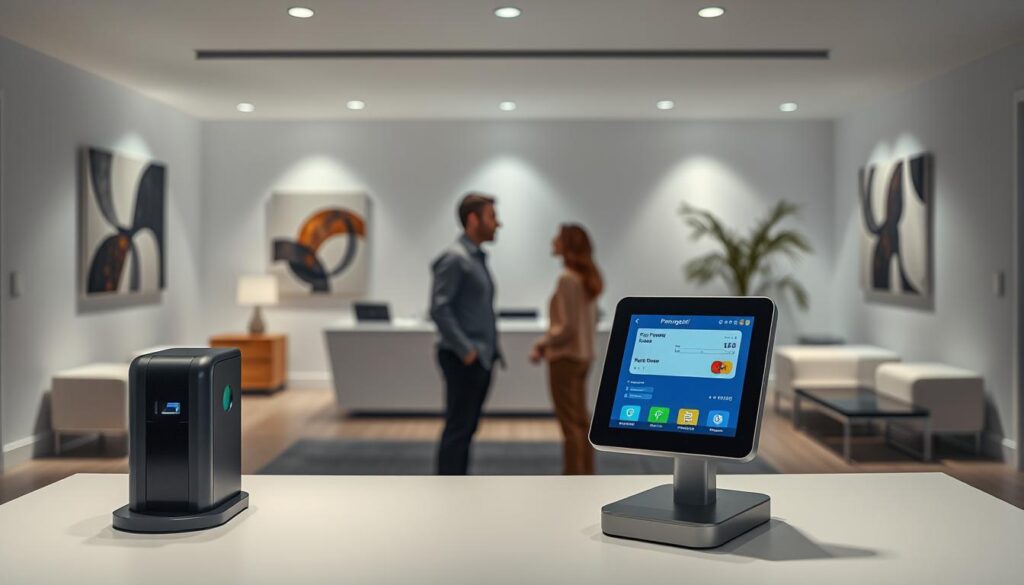
Biometric Fee Details
The CAD 85 per person charge covers digital fingerprinting and photograph capture. Families submitting together pay CAD 170 total – a 60% saving compared to individual rates. These payments occur through government-approved centers during scheduled appointments.
Your biometric data remains valid for 10 years. Subsequent applications within this period skip repeat collection. Most credit and debit cards get accepted, though options vary by location.
Other Ancillary Expenses
Travel costs to collection centers often surprise applicants. These facilities typically operate in major cities, requiring some to budget for transportation or accommodation. Appointments get booked within 30 days of payment confirmation through the authorization portal.
Plan for half-day commitments including wait times and processing. While biometric submission takes minutes, center locations and availability impact overall timelines. Always confirm specific requirements with your application instructions.
Comparing Processing Times and Payment Methods
Understanding approval durations and payment channels prevents last-minute hassles. Approval wait periods vary depending on entry purpose and submission volume. Let’s explore how different permits compare and what payment solutions work best.
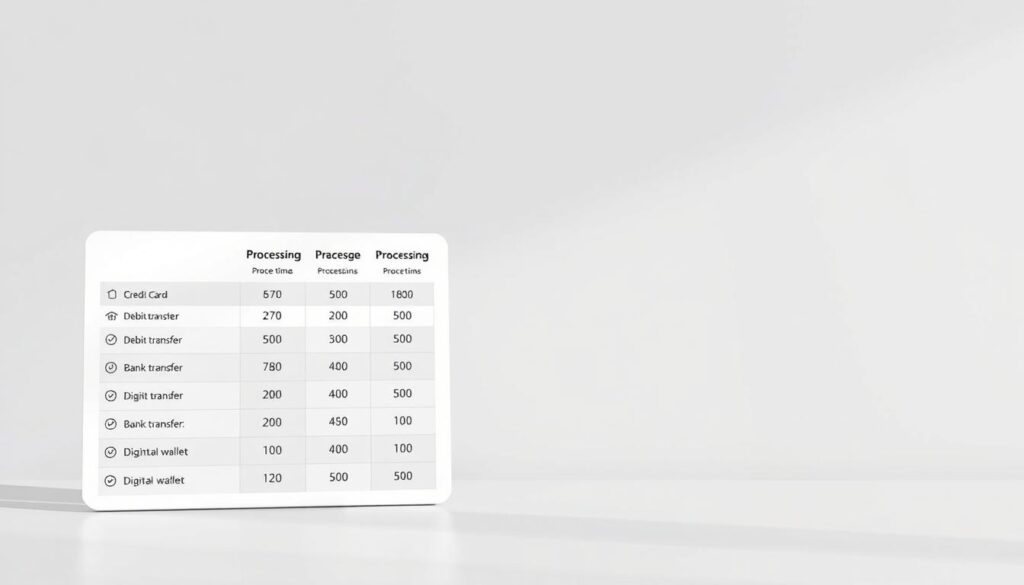
Processing Time Insights
Tourist requests typically take eight weeks to complete. Work permits under the Global Skills Strategy often clear in 14 days – ideal for urgent professional needs. Study permits mirror tourist processing timelines, requiring at least two months’ advance planning.
Location impacts timelines. Applications from regions with higher verification needs might extend wait periods. Always submit one month before your travel date to accommodate unexpected delays.
Payment Options at Visa Application Centres
Digital payments through official portals accept major credit cards instantly. Physical centers offer cash, debit cards, or bank drafts – methods vary by facility. Pro tip: Keep payment receipts until your application concludes.
Tracking tools update you in real-time using reference numbers. This feature helps manage expectations during peak seasons when processing slows. Choose payment methods aligning with your urgency and location constraints.
Practical Tips for a Smooth Visa Application
Careful planning and organization make the difference between approval delays and seamless processing. Recent updates require extra attention to documentation quality and submission timelines. Three critical elements demand focus: complete paperwork, strategic timing, and understanding policy shifts.
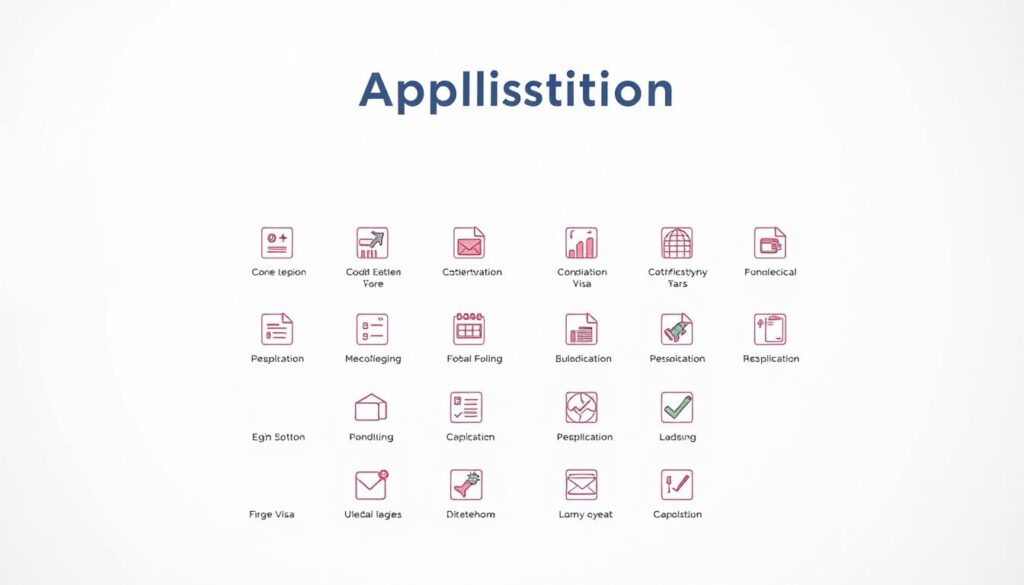
Preparing Your Documents
Create a master checklist before uploading materials through the official portal. Missing one item could return your submission unprocessed. Essential items include:
| Document Type | Requirements | Key Notes |
|---|---|---|
| Passport Copy | All pages, high-resolution scan | Valid 6+ months post-travel |
| Photographs | 35×45 mm, neutral background | Dated within 30 days |
| Financial Proof | 3-month bank statements | Translated if not in English/French |
| Supporting Docs | Employment letters, itineraries | Notarized where required |
Immigration officers now evaluate entry duration individually instead of issuing automatic 10-year permits. Strengthen your case with evidence of home country ties like property deeds or employment contracts.
Optimising Your Application Timing
Submit requests at least four weeks before departure dates. This accounts for:
- 14-day biometric scheduling windows
- Average 3-week processing periods
- Potential document revision requests
Avoid summer and holiday rushes when centers face 40% higher volumes. November-February submissions often clear faster. Track portal updates for real-time processing estimates based on your entry purpose.
Remember: Work and study permits require additional verification steps. Build extra buffer time for these categories compared to standard travel requests.
Conclusion
Smart travel planning starts with accurate cost breakdowns. The official portal remains your primary resource for current requirements and policy adjustments. First-time applicants typically invest CAD 185 total – combining base authorization charges with biometric collection.
Family groups save significantly through bundled rates. Five applicants pay CAD 500 instead of individual rates. Recent immigration updates now tailor validity periods to each traveler’s profile rather than offering automatic decade-long approvals.
Success hinges on two factors: precise documentation and realistic timelines. Allocate eight weeks for standard processing, including biometric appointments. Your fingerprints stay valid for 10 years, but each entry request requires fresh submission.
Always verify updates through government channels before applying. Third-party sites might display outdated fee structures or procedures. Proper preparation transforms complex processes into manageable steps for work, study, or leisure travel.



